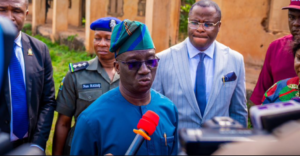

Stakeholders on Wednesday called for greater awareness and a stronger stance against the stigmatisation of Autism Spectrum Disorder.
They made this known in Abuja at the 2025 ‘Shine your light autism spectrum conference, themed, “Navigating autism with understanding in Africa,” organised by Ike Foundation for Autism in commemoration of the World Autism Awareness Day.
World Autism Awareness Day is recognised annually on April 2nd to promote acceptance, and inclusion, and recognise the contributions autistic people make to their communities and the world at large.
Speaking at the conference, the Executive Director of Ike Foundation for Autism, Dafe Smith called for a shift in how society views autism, moving away from shame and isolation toward understanding and support.
He also highlighted the need for increased awareness to eliminate the stigma surrounding autism, particularly in communities where children with autism are often hidden or isolated.
He said, “For long, autism has been met with misconception, stigma, and silence, and the objective of the conference is to shine your light on autism. If you have an autistic child, you don’t need to hide the child. There are provisions for the child to have access to care. Gone are the days when we are not proud to talk about it. If you have an autistic child, ask questions; there are medical provisions available for that child to have access to care, so don’t hide it.
“We have established an early intervention centre where parents can come to and then engage their children with a therapist who will take them through the early intervention plan and eventually they will receive all the therapeutic services they need to improve their well-being, because we have cases of parents whose children have been diagnosed with autism but they don’t know where to receive healthcare services for their children.
“We’re advocating for acceptance, increased awareness, and we are speaking against discrimination.”
A neurologist at the Maitama District Hospital, Abuja, Dr Mimi Osamwonyi explained that autism is a neurobehavioral condition that includes impairments in social interaction, and communication skills combined with repeated or rigid behaviours.
“The combination of behaviours or symptoms has led to the name autism spectrum disorder. You find some people have one end of the spectrum, others have the other end, and so on.
“Globally, it’s estimated that one in 10 children has this disorder, and the prevalence rate in low- and middle-income countries is unknown, largely because of the lack of data. In Nigeria, studies suggest a prevalence of about 2.3 per cent. However, there are challenges in accurate diagnosis, and the data collection leads to poor underestimation. It appears to affect more boys than girls,” she stated.
She said some of the factors responsible for the condition are genes, family history, and prenatal exposure to valproic acid.
“Early diagnosis and intervention can improve behaviour skills and leverage development. However, intervention is helpful at any age. This is not to discourage any parents who have a child with a spectrum disorder and have just found that, but what we’re saying is that it’s better when you pick it up early. The goal is to optimise functionality and independence,” she said.
She noted that delayed diagnosis may lead to social isolation, poor academic performance, challenges in independence, emotional struggles, low self-esteem, and lack of self-acceptance, among others.
She advocated collaboration, community awareness events, using traditional media, and providing educational resources to better inform the public and increase support for autism research and awareness.
In her keynote address, the Director of the Family Health Department at the Federal Ministry of Health and Social Welfare, Dr Binyerem Ukaire, said autism is often misunderstood and stigmatised in Nigeria, leading to challenges in accessing services and support.
Ukaire, who was represented by Mrs Helen Akhigbe-Ikechukwu, said to reduce the stigmatisation, all stakeholders need to work on early diagnosis and intervention as they are crucial for maximizing the potential of individuals with autism.
She added that there is a need for “Creating inclusive educational environments where individuals with autism can learn and thrive alongside their peers is essential; building a supportive community that understands and embraces individuals with autism is vital for their well-being and inclusion; and empowering individuals with autism to advocate for their rights and participate fully in the society and for Civil Society to advocate for more financial funding for children with special needs.”
The Chairman, Parents Therapist Association at the Ike Foundation for Autism, Ajala Ibrahim, emphasised the importance of awareness early diagnosis, and early intervention for autism.
He encouraged society to see autistic children as individuals with potential, rather than stigmatising them.
“The government needs to invest in creating awareness about this because it is expensive to manage the condition. The government needs to invest in technology to help people with the condition and ensure that their talents are discovered early,” he stated.
On his part, the Minister of State for Youth Development, Ayodele Olawande, said
The autism spectrum is not a limitation but a different way of experiencing the world.
Olawande, who was represented by his Senior Technical Advisor on Youth Health and Policy Research, Dr Obinna Ebirim, noted that the ministry’s strategic plan for the next two years is underpinned by inclusivity and collaborations to support, empower, and protect young people.
“This means inclusive policies and programmes including those specifically targeting young persons with disabilities, including those within the autism spectrum, ensuring they have access to skills development, and empowerment opportunities,” he said.t








